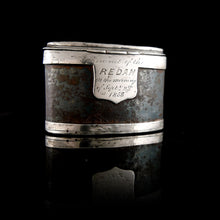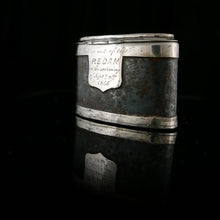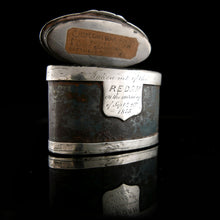Crimean War - A Relic from the Fall of Sebastopol, 1855
- Regular price
- £2,800
- Sale price
- £2,800
- Regular price
-
- Unit price
- /per
Adding product to your cart
Measurements: 5cm (2in) x 7.2cm (2.8in) x 3.9cm (1.5in)
Silver mounted snuff or tobacco box. Of ovoid form with hinged wooden lid, gunmetal body a and wood base. Silver escutcheon engraved ‘Taken out of the Redan, on the morning of Septr 9th 1855’.
On 8 September 1855, 60,000 French and British troops assaulted Sebastopol’s defences after a prolonged bombardment and previous costly attempts. The British Light Division attacked the Great Redan while the French 1st Division, under General MacMahon , directed their efforts on the Malakoff Tower and the Little Redan. To the minds of many Victorians, the British assault was the crowning moment of the Crimean War. Although initially successful, it was a failure because the Great Redan was little more than an open backed position that could not be held in the face determined Russian counter-attacks, whereas the Malakoff, being a a tower surrounded by a moat, allowed the French to mount a defence that ultimately made the Russian occupation of the southern part of the city untenable. By the morning of the 9th the Russians evacuated the southern side of the city leading to the Fall of Sebastopol and Allied victory in the war.










